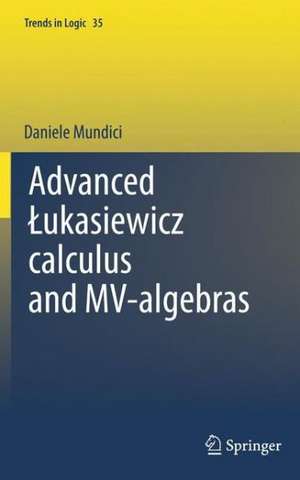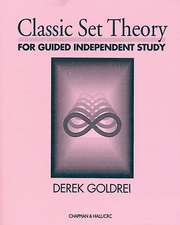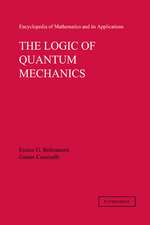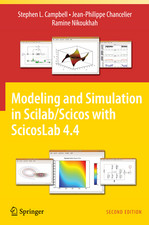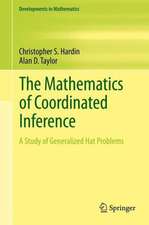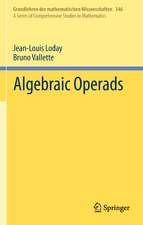Advanced Łukasiewicz calculus and MV-algebras: Trends in Logic, cartea 35
Autor D. Mundicien Limba Engleză Paperback – 3 aug 2013
| Toate formatele și edițiile | Preț | Express |
|---|---|---|
| Paperback (1) | 558.87 lei 38-44 zile | |
| SPRINGER NETHERLANDS – 3 aug 2013 | 558.87 lei 38-44 zile | |
| Hardback (1) | 642.51 lei 6-8 săpt. | |
| SPRINGER NETHERLANDS – 23 iun 2011 | 642.51 lei 6-8 săpt. |
Din seria Trends in Logic
-
 Preț: 365.81 lei
Preț: 365.81 lei -
 Preț: 361.11 lei
Preț: 361.11 lei - 18%
 Preț: 1225.48 lei
Preț: 1225.48 lei - 18%
 Preț: 959.50 lei
Preț: 959.50 lei - 15%
 Preț: 646.94 lei
Preț: 646.94 lei - 15%
 Preț: 641.85 lei
Preț: 641.85 lei - 18%
 Preț: 1387.73 lei
Preț: 1387.73 lei - 15%
 Preț: 644.82 lei
Preț: 644.82 lei - 15%
 Preț: 646.75 lei
Preț: 646.75 lei - 15%
 Preț: 636.12 lei
Preț: 636.12 lei - 15%
 Preț: 647.40 lei
Preț: 647.40 lei - 15%
 Preț: 641.03 lei
Preț: 641.03 lei - 18%
 Preț: 733.03 lei
Preț: 733.03 lei -
 Preț: 385.47 lei
Preț: 385.47 lei - 18%
 Preț: 960.42 lei
Preț: 960.42 lei - 18%
 Preț: 956.18 lei
Preț: 956.18 lei - 18%
 Preț: 952.09 lei
Preț: 952.09 lei - 20%
 Preț: 1276.86 lei
Preț: 1276.86 lei - 18%
 Preț: 951.14 lei
Preț: 951.14 lei - 15%
 Preț: 643.00 lei
Preț: 643.00 lei - 15%
 Preț: 644.49 lei
Preț: 644.49 lei - 18%
 Preț: 1845.48 lei
Preț: 1845.48 lei - 18%
 Preț: 953.65 lei
Preț: 953.65 lei - 15%
 Preț: 635.47 lei
Preț: 635.47 lei - 18%
 Preț: 894.79 lei
Preț: 894.79 lei - 24%
 Preț: 1205.41 lei
Preț: 1205.41 lei - 15%
 Preț: 635.80 lei
Preț: 635.80 lei
Preț: 558.87 lei
Preț vechi: 698.59 lei
-20% Nou
Puncte Express: 838
Preț estimativ în valută:
106.95€ • 111.03$ • 89.18£
106.95€ • 111.03$ • 89.18£
Carte tipărită la comandă
Livrare economică 21-27 martie
Preluare comenzi: 021 569.72.76
Specificații
ISBN-13: 9789400736603
ISBN-10: 9400736606
Pagini: 276
Ilustrații: XVIII, 258 p.
Dimensiuni: 155 x 235 x 14 mm
Greutate: 0.39 kg
Ediția:2011
Editura: SPRINGER NETHERLANDS
Colecția Springer
Seria Trends in Logic
Locul publicării:Dordrecht, Netherlands
ISBN-10: 9400736606
Pagini: 276
Ilustrații: XVIII, 258 p.
Dimensiuni: 155 x 235 x 14 mm
Greutate: 0.39 kg
Ediția:2011
Editura: SPRINGER NETHERLANDS
Colecția Springer
Seria Trends in Logic
Locul publicării:Dordrecht, Netherlands
Public țintă
ResearchCuprins
Preface.- Chapter 1. Prologue: de Finetti coherence criterion and Łukasiewicz logic.- Chapter 2. Rational polyhedra, Interpolation, Amalgamation.- Chapter 3. The Galois connection (Mod, Th) in Ł∞ 21.- Chapter 4. The spectral and the maximal spectral space.- Chapter 5. De Concini-Procesi theorem and Schauder bases.- Chapter 6. Bases and finitely presented MV-algebras.- Chapter 7. The free product of MV-algebras.- The construction of free products.- Chapter 8. Direct limits, confluence and multisets.- Chapter 9. Tensors.- Chapter 10. States and the Kroupa-Panti Theorem.- Chapter 11. The MV-algebraic Loomis-Sikorski theorem.- Chapter 12. The MV-algebraic Stone-von Neumann theorem.- Chapter 13. Recurrence, probability, measure.- Chapter 14. Measuring polyhedra and averaging truth-values.- Chapter 15. A Rényi conditional in Łukasiewicz logic.- Chapter 16. The Lebesgue state and the completion of FREEn.- Chapter 17. Finitely generated projective MV-algebras.- Chapter 18. Effective procedures for Ł∞ and MV-algebras.- Chapter 19. A first-order Łukasiewicz logic with [0, 1]-identity.- Chapter 20. Applications, further reading, selected problems.- Chapter 21. Background results.- Special Bibliography. References. Index.
Recenzii
From the reviews:
“The book is recommended for professional researchers and advanced students with an appropriate mathematical background. The book covers most of the recent developments in Łukasiewicz infinite-valued calculus and MV-theory. … The presentation is clearly structured and self-contained. The book consists of twenty chapters and two appendices, and a suitable bibliography is offered at the end of each chapter. Some of the chapters can be read independently from the others.” (Manuela Busaniche, Mathematical Reviews, Issue 2012 i)
“The author of this book is one of the leading scientists in the field of MV-algebras, and in this work he presents his recent results, collecting them in a monograph that every scholar interested in many-valued logic should consult for his studies. The book is intended as a text for a second course on infinite-valued Łukasiewicz logic … . Each chapter focuses on a specific topic and chapters are almost independent from each other.” (Brunella Gerla, Zentralblatt MATH, Vol. 1235, 2012)
“The book is recommended for professional researchers and advanced students with an appropriate mathematical background. The book covers most of the recent developments in Łukasiewicz infinite-valued calculus and MV-theory. … The presentation is clearly structured and self-contained. The book consists of twenty chapters and two appendices, and a suitable bibliography is offered at the end of each chapter. Some of the chapters can be read independently from the others.” (Manuela Busaniche, Mathematical Reviews, Issue 2012 i)
“The author of this book is one of the leading scientists in the field of MV-algebras, and in this work he presents his recent results, collecting them in a monograph that every scholar interested in many-valued logic should consult for his studies. The book is intended as a text for a second course on infinite-valued Łukasiewicz logic … . Each chapter focuses on a specific topic and chapters are almost independent from each other.” (Brunella Gerla, Zentralblatt MATH, Vol. 1235, 2012)
Notă biografică
Daniele Mundici received his Laurea degree in Physics from the University of Modena. He is currently Professor of Mathematical Logic at the University of Florence, and has been Professor of Algorithms and Computability at the University of Milan.
He has taught at universities in Europe, Africa and America.
He serves as a managing editor of various journals in logic, algebra and applied mathematics. He has been the President of the Kurt Gödel Society in Vienna and of the Italian Association for Logic and Applications. He is a member of the International Academy of Philosophy of Science, Bruxelles and a corresponding member of the National Academy of Exact Sciences, Buenos Aires.
He is the author of three books and over 140 research papers in logic, algebra and theoretical computer science.
He has taught at universities in Europe, Africa and America.
He serves as a managing editor of various journals in logic, algebra and applied mathematics. He has been the President of the Kurt Gödel Society in Vienna and of the Italian Association for Logic and Applications. He is a member of the International Academy of Philosophy of Science, Bruxelles and a corresponding member of the National Academy of Exact Sciences, Buenos Aires.
He is the author of three books and over 140 research papers in logic, algebra and theoretical computer science.
Textul de pe ultima copertă
In recent years, the discovery of the relationships between formulas in Łukasiewicz logic and rational polyhedra, Chang MV-algebras and lattice-ordered abelian roups, MV-algebraic states and coherent de Finetti’s assessments of continuous events, has changed the study and practice of many-valued logic. This book is intended as an up-to-date monograph on infinite-valued Łukasiewicz logic and MV-algebras. Each chapter features a combination of classical and re¬cent results, well beyond the traditional domain of algebraic logic: among others, a comprehensive account is given of many effective procedures that have been re¬cently developed for the algebraic and geometric objects represented by formulas in Łukasiewicz logic.The book embodies the viewpoint that modern Łukasiewicz logic and MV-algebras provide a benchmark for the study of several deep mathematical prob¬lems, such as Rényi conditionals of continuously valued events, the many-valued generalization of Carathéodory algebraic probability theory, morphisms and invari¬ant measures of rational polyhedra, bases and Schauder bases as jointly refinable partitions of unity, and first-order logic with [0,1]-valued identity on Hilbert space.Complete versions are given of a compact body of recent results and techniques, proving virtually everything that is used throughout, so that the book can be used both for individual study and as a source of reference for the more advanced reader.
Caracteristici
Written for self-study References the self-contained book Trends in Logic 7 (co-authored by the same author) Deals with the logic and probability of continuously-valued events, just as boolean logic deals with yes-no events Focuses on Lukasiewicz logic and their algebras, because of the powerful mathematical tools available here
